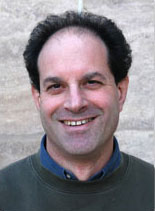49th Annual Faculty Research Lecture in Basic Science
Awarded to David Julius, PhD
The Academic Senate is pleased to announce the selection of David Julius, PhD, as the recipient of the 49th Annual Faculty Research Lecture.
Each year this distinction proudly acknowledges the outstanding scientific achievements made by a member of the Academic Senate. Academic Senate members are asked to consider the contributions of their colleagues so that the University community may recognize their achievements.
Date/Location: Tuesday, April 25, 2006 at 3:30 pm in Cole Hall

David Julius was born on November 4, 1955 in Brighton Beach, Brooklyn, where he attended public elementary and high schools. David received his undergraduate degree from MIT (1973-77), gaining his first research experience in the laboratory of Alexander Rich studying mechanisms of tRNA aminoacylation. He then moved to the University of California at Berkeley for graduate studies (1977-84), where he worked with Jeremy Thorner and Randy Schekman to elucidate mechanisms of peptide hormone processing and secretion in Saccharomyces yeast. For postdoctoral studies (1984-1990), David joined Richard Axel’s group at Columbia University, where his focus turned to neuropharmacology and receptor function. During this time, David developed novel expression cloning methods that enabled him to identify genes encoding members of the serotonin receptor family. David then joined the faculty at the University of California, San Francisco (1990), where he is currently Professor and Vice-Chair of the Department of Cellular and Molecular Pharmacology. A major focus of David’s work is to elucidate molecular mechanisms of somatosensation and pain. His group has exploited the properties of natural products to discover a family of thermosensitive ion channels that enable sensory nerve fibers to detect hot or cold temperatures.
David serves on the Board of Directors of The McKnight Endowment Fund for Neuroscience and the Scientific Advisory Committee of the Damon Runyon Cancer Research Foundation. He is a member of the National Academy of Sciences and the American Academy of Arts and Sciences. David is married to Holly Ingraham, a Professor of Physiology at UCSF, and their son is Philip Julius.
David has received the following honors and awards in recognition of his scientific contributions:
| 1976 | Eloranta Research Fellow of the Massachusetts Institute of Technology |
| 1981 | University of California Graduate Studies Award |
| 1984 | Jane Coffin Childs Fellow |
| 1990 | March of Dimes Basil O’Conner Research Award |
| 1990 | PEW Scholar in Biomedical Sciences |
| 1990 | NSF Presidential Young Investigator Award |
| 1990 | McKnight Scholar in Neuroscience |
| 1996 | Shosaku Numa Memorial Lectureship, Kyoto University, Japan |
| 1997 | McKnight Investigator in Neuroscience |
| 1997 | Syntex Prize in Receptor Pharmacology |
| 1997 | Sir Lewis Thomas Pain Lectureship, University College London |
| 1998 | Presidential Symposium Speaker, Society for Neuroscience |
| 1998 | Sandler Award in Basic Science, UCSF |
| 1998 | Brook Byers Award in Basic Science, UCSF |
| 1999 | Louis S. Harris Distinguished Lectureship, Medical College of Virginia, Richmond, VA |
| 2000 | 15th S. W. Kuffler Lectureship, Department of Neurobiology, Harvard Medical School, MA |
| 2000 | 1st Perl-UNC Prize in Neuroscience, University of North Carolina, Chapel Hill, NC |
| 2002 | F.O. Schmitt Lectureship, MIT, Cambridge, MA |
| 2003 | Jacob Javits Award, NIH/NINDS |
| 2003 | 11th Yngve Zotterman Prize of the Physiological Society, Stockholm, Sweden |
| 2004 | 34th Annual Schueler Distinguished Lectureship in Pharmacology, Tulane University |
| 2004 | Elected to the National Academy of Sciences |
| 2005 | 7th C.R. Stephen Lecture, Washington Univ. School of Medicine, St. Louis |
| 2005 | Elected to the American Academy of Arts and Sciences |
| 2006 | Frederick W.L. Kerr Basic Science Research Award of the American Pain Society |
| 2006 | K.J. Zülch Prize for Basic Neurological Research, the Max Planck Society |
It is a great privilege for the Academic Senate to have the opportunity to honor his achievements with this prestigious award.
The lecture is open to the campus community and the general public.
